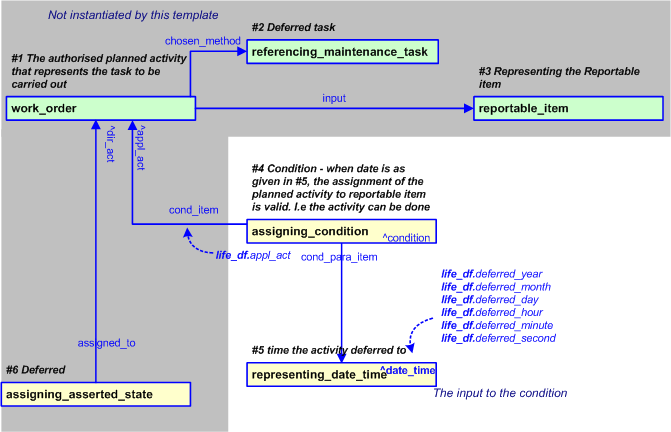Template:— time_deferment (tme_def)
Context:— MoDAvDEX |
Date: 2008/01/31 07:22:19
Revision: 1.4
|
This section specifies the template time_deferment.
NOTE
The template has been defined in the context of
MoDAvDEX.
Refer to the business context for details of related templates.
NOTE
An explanation of a template and the associated instantiation path is
provided in the
Template overview
section.
This template describes how to represent the deferral of a maintenance activity to
a specified date and time.
The EXPRESS-G diagram in
Figure
1
shows the templates and EXPRESS entities that are required
to represent the template
"time_deferment".
The text highlighted in blue shows the template parameters.
Figure 1 — An EXPRESS-G representation of the Information model for time_deferment
The graphic for the template to be used in other EXPRESS-G diagrams
is shown in Figure
2
below.
Figure 2 — The graphical representation of the time_deferment template
The following input parameters are defined for this template:
The assignment of the deferred activity to the reportable item.
The year component of the date the activity has been deferred to.
The month component of the date the activity has been deferred to.
The day component of the date the activity has been deferred to.
The hour component of the date the activity has been deferred to.
The minute component of the date the activity has been deferred to.
This parameter is optional. If not given, it will remain unset.
The second component of the date the activity has been deferred to.
This parameter is optional. If not given, it will remain unset.
The following reference parameters are defined for this template:
Allow the
Condition
entity instantiated in this path to be referenced when this template is used.
Note: The
Condition
entity can be referenced in a template path by:
%^target = $time_deferment.condition%
where
target
is the parameter to which the
Condition
is bound.
The instantiation path shown below specifies the entities that are to be
instantiated by the template.
A description of templates and the syntax for the instantiation path is
provided in the
Templates Help/Information section.
/
representing_date_time(
year=@deferred_year,
month=@deferred_month,
day=@deferred_day,
hour=@deferred_hour,
minute=@deferred_minute,
second=@deferred_second,
sense=.EXACT.,
hour_offset='0',
minute_offset='0')/
%^date_time = $representing_date_time.date_time%
/
assigning_condition(
cond_item=@appl_act,
cond_asg_class='Deferred_activity_assignment',
cond_asg_ecl_id='urn:plcs:rdl:std',
cond_class='Deferred_time_condition',
cond_ecl_id='urn:plcs:rdl:std',
cond_para_item=^date_time)/
%^condition = $assigning_condition.cond%
Characterizations
No common characterizations of the template
time_deferment
have been identified. However, the ISO 10303-239 EXPRESS model
may enable other assignments to the entities instantiated by the template.


